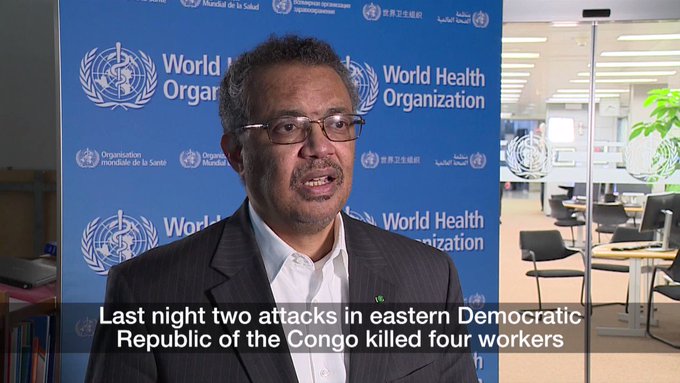Violence in DR Congo Ebola hotspot leaves people ‘caught in crossfire’

Members of the Mbuti indigenous community stand beside their shelters at a makeshift site for internally displaced persons in Beni territory, North Kivu.
29 November 2019
Attacks on communities in an Ebola outbreak hotspot in eastern Democratic Republic of the Congo (DRC) have sparked a humanitarian crisis and threatened aid distribution, the UN said on Friday, amid reports of serious civil unrest.
Tensions in eastern Beni territory in DRC’s North Kivu province have been rising since the launch of a Government-led security operation against the Allied Democratic Forces (ADF) on 30 October, UN refugee agency (UNHCR) spokesperson Charlie Yaxley told journalists in Geneva.
Armed groups have been targeting civilians and displaced populations in the region, killing scores of people and leaving others “caught in the crossfire”, he added.
Aid teams’ security ‘can’t be guaranteed any more’
In a statement on Friday, Hervé Verhoosel, spokesperson for the UN World Food Programme (WFP) said that the agency had temporarily suspended aid distribution “because both our staff – and more importantly the staff of the partners who are working with us on the ground – the security was not guaranteed anymore, and the access was very difficult”.
As a result, “thousands of people will not receive food assistance in the coming days,” he added.
According to UNHCR, Beni town is home to around 500,000 people. “We understand there’s at least 275,000 people in the surrounding areas who’ve already been displaced, and conditions are quite dire and deteriorating,” Mr. Yaxley said.
Armed groups preying on children
Children need immediate support, he continued, as many “have lost their parents or have arrived unaccompanied. Forced recruitment by armed groups is a real threat to the safety of children and women also face widespread sexual violence, abuse and risk of exploitation.”
The development comes as people in eastern DRC continue to be targeted by a multitude of armed groups, with at least 100 people reportedly killed in violent attacks in the Beni region and thousands displaced since 2 November, UNHCR said.
Highlighting the impact of the insecurity in Beni and Oicha on frontline healthworkers tasked with tracing anyone who has come into contact with people infected with Ebola, Christian Lindmeier, spokesperson for the UN World Health Organization (WHO), said that surveillance levels had dropped from 86 to 59 per cent at the start of the week.
According to WHO, around one-third of WHO’s Ebola response personnel in Beni have been temporarily relocated to Goma.
Drop in frontline access ‘sure’ to hamper Ebola prevention
“These are essential functions of the response that are well known to reduce the risk of spread of the virus and the fluctuations in performance following insecurity may enable – well, we’re actually pretty sure it will enable - new chains of transmission,” he explained.
As of 26 November, a total of 3,304 cases of Ebola have been reported, of which 2,199 people have died since the outbreak was declared on 1 August 2018, WHO reported.
In an appeal for an end to the violence in and around Beni, UNCHR’s Mr. Yaxley warned that humanitarian agencies needed “immediate access to support the affected population. Hundreds of households are currently sleeping in churches and schools.”
Some groups of people were “trapped”, he said, noting that they were surrounded by armed forces and facing “ongoing attacks against schools (and) health centres. Even where people are known to be sheltering, they’re being displaced again because of these attacks by armed groups. At times, people are getting caught in the crossfire.”
In its latest update on the outbreak, the country’s Ministry of Health noted the “disruption of activities in the sectors of Beni and Butembo, following popular demonstrations at the killing of civilians”.
“Widespread violence” had erupted in the town of Beni nine days ago, the WFP official told journalists, precipitating the decision to temporarily move “non-essential staff” to Goma in the south of the country.
‘Constant’ attacks must stop: WHO
The development also follows attacks by armed groups on Wednesday at a camp in Biakato Mines and an Ebola response coordination office that claimed the lives of three responders and a police officer, injuring six others.
Condemning the violence, the WHO appealed for the “constant” attacks to stop, the development risks reversing significant progress made against the epidemic, with infections falling to just a handful in recent weeks.
Earlier this month in the town of Lwemba, Ituri province, attackers killed an Ebola response community health worker and left his wife critically injured before burning down their home. The victim was also a reporter for a community radio station, helping to raise Ebola awareness.





No comments:
Post a Comment